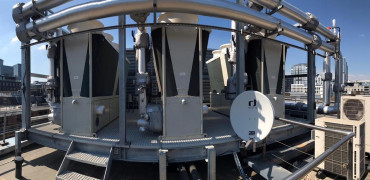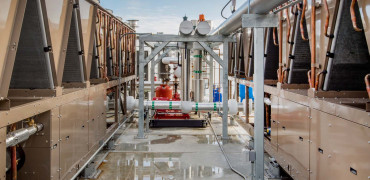Graham Martin from our Service & Maintenance team explains why going beyond the basic refrigerant check is a chance to ensure your systems operate at peak performance
Under the F Gas Regulations, owners of air conditioning systems must arrange regular refrigerant leak checks for their equipment, to reduce the likelihood of accidental release of refrigerants (F gases) into the environment.
Responsibility for stopping leaks of F gas from equipment is shared between the users of the equipment and service technicians who install, maintain or dispose of the equipment. It’s therefore important to work with a well-qualified maintenance team.
The Mitsubishi Electric Service & Maintenance team members are REFCOM Elite certified F Gas engineers.
They have up-to-date industry knowledge and work to best-practice standards. Our expert team can even strip down and reassemble equipment, which can be necessary in locations where equipment is difficult to access.
The standard refrigerant leak check is the equivalent of an MOT for your car
A missed opportunity
This is an important point, because our know-how goes beyond the basic requirements of F Gas checking and record-keeping.
And it means we can offer far more than a basic leak test. While there’s nothing wrong in simply carrying out the required checks, it could be a missed opportunity to review your system performance, optimise energy use and extend the lifetime of equipment.
What’s more, while modern air conditioning equipment is designed and built to last, it needs regular service and maintenance to do so.
Left to its own devices, equipment will start to struggle. Even if it doesn’t develop faults, it can start to use more energy and cost more in emergency call-outs.
Service and maintenance experts can prevent this, keeping your building energy use on track and retaining the value of your investment in equipment.
Under pressure
Another good reason to establish a regular maintenance programme is to ensure your equipment performs under pressure.
July 2022 saw the UK experience extreme high temperatures, and experts say we can expect more of those in the future.
Keeping buildings cool will be vital for occupant health and comfort – building managers need to know they can rely on the equipment to perform when it’s most needed.
The Mitsubishi Electric Service & Maintenance engineers use the latest technology for in-field reporting and diagnostics. This level of technical support means that we can keep products working at their optimum, delivering great performance and energy efficiency.
Remote monitoring
This technology also means that even when our engineers aren’t on-site, your equipment can still be observed and optimised. Our service and maintenance experts are already helping clients to examine and monitor the energy use of HVAC systems remotely.
Our monitoring services can track equipment performance continuously – spotting irregularities in performance quickly with data analysis tools.
Another good reason to go beyond leak checks for your system is to keep building energy use in check. As the UK focuses on achieving net zero emissions by 2050, energy use in buildings is under scrutiny. New legislation is setting higher efficiency standards across the board.
A vital practice
Good maintenance practice is vital to ensure that buildings maintain operational efficiency.
This is particularly true for building services, where we generally find a significant level of energy use in cooling and heating systems.
Keeping equipment such as chillers performing at their optimal level means that regular service and maintenance must be top of the agenda.
The standard refrigerant leak check is the equivalent of an MOT for your car: it will establish that your vehicle is roadworthy; but a full service by qualified mechanics is needed to keep the car running smoothly.
And like a car, air conditioning equipment such as a chiller is a significant investment, so it’s worth taking the time to extend these checks to include regular servicing to keep your cooling and heating systems fully operational and optimised for performance and efficiency.
Graham Martin is Business Development Manager




